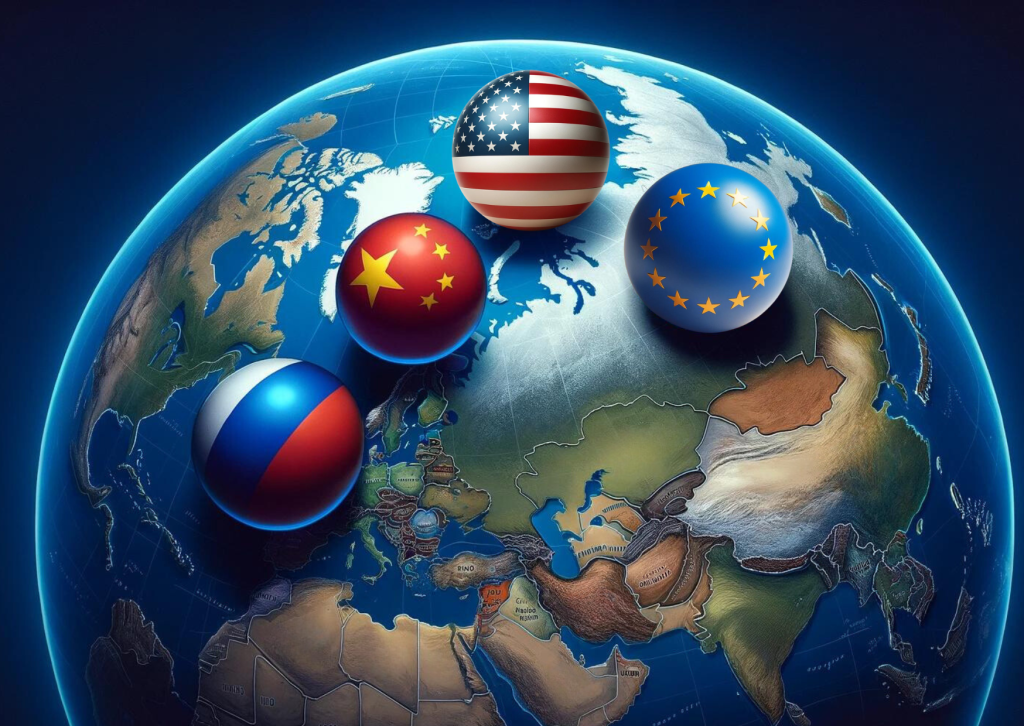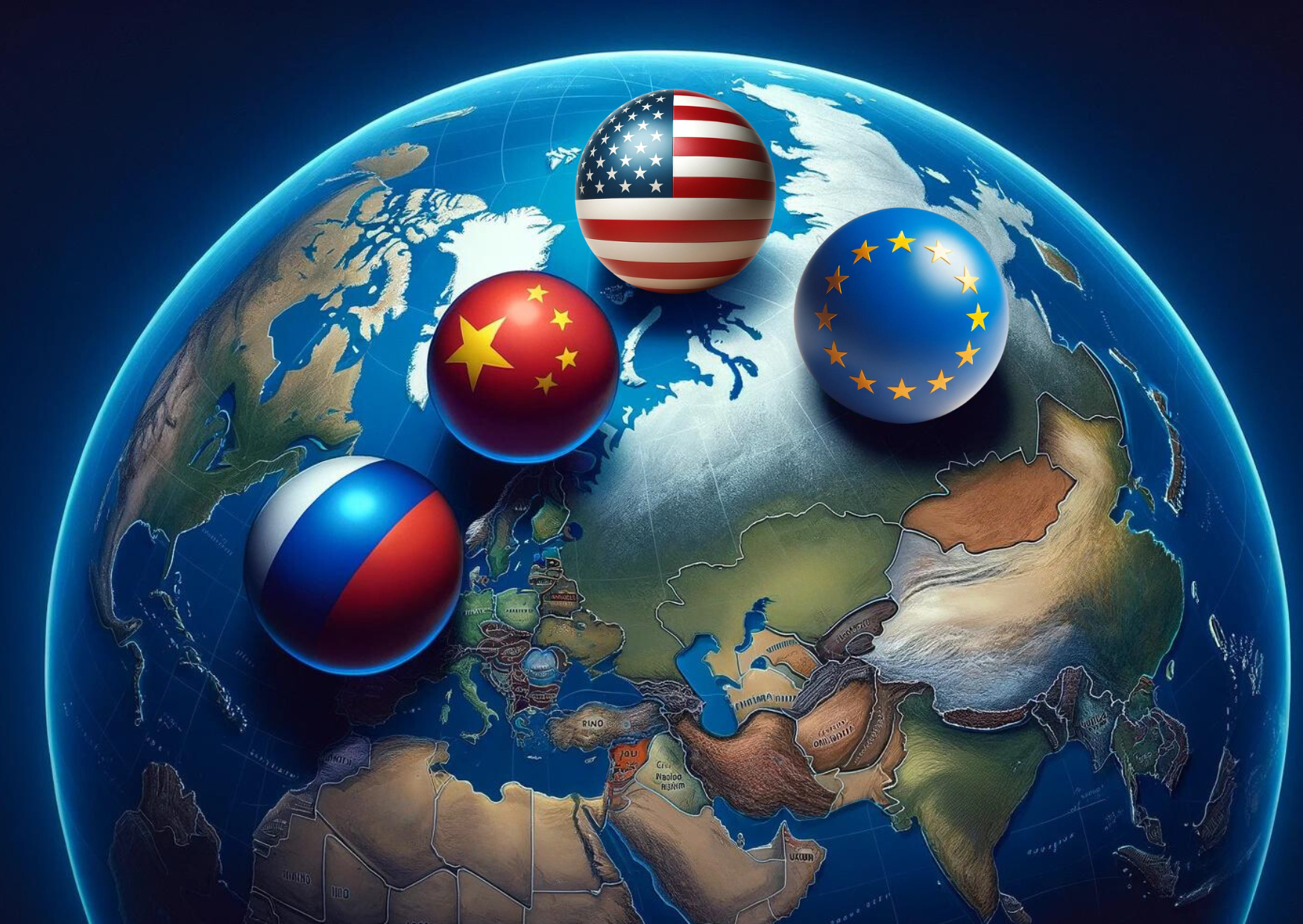
The presence of globally influential power centers such as the USA, China, and Russia highlights the challenges the EU faces in claiming leadership in a unipolar or bipolar order.
MARCH 06, 2024

The European Union stands in the middle of a dynamic yet dazzling labyrinth of international politics. The global community has been familiar with few major powers to shape the global political landscape and to direct the world order, known as influential “poles”. However, the shifting world of international relations requires the EU to define their position among global politics – unipolar, bipolar, or multipolar – which aligns their goal and interest.
Perhaps the existing powerful polar actors of today’s geopolitics (The US, China, Russia) allow us to easily exclude the EU from either unipolar or bipolar systems. Envisioning either single or bipolarity of EU dominance allows them to hold ultimate authority to dictate the direction of the international landscape. Moreover, this influence allows Brussels to set trade and environmental standards globally while advocating EU values to promote core principles like democracy, equality, social justice. However, these global actors are stronger than ever today and have huge capabilities which the EU doesn’t. This is why the EU would have a hard time if they look forward to possessing dominance, and is not likely to execute a movement to dominantly act to replace such powers and become a unipolar or bipolar on the international political surface.
The US has been leading over the EU in various aspects in a way that their polarity in power is impossible for the EU to replace or oppose. Besides the fact that they are allies, the EU remains reliant on the defence sector in some occasions, such as being dependent on American aid prior to the Ukrainian war, or purchasing defence artillery from the US, despite president Emmanuel Macron calling for purchasing such military equipment only from Europeans. Furthermore, as the US owns rich domestic resources in energy supply, this opposes the EU situation, where they struggle with energy prices and hanging on Russia’s gas supply, which has become complicated due to the Ukrainian war. Moreover, the European technological landscape is also full of the US company dominance, and top notch universities in global rankings are still filled with US universities. Hence, these factors have highlighted the power gap of the US compared to the EU indicating no possible outcome of the EU to replace the US in the international political polarity system.
China, another global powerhouse, also acts as a main player among the polarity of global politics. As a strong US ally, the EU views China not as an opposition, but not as close as their relationship with the US either, meaning that both are not on the same side of international geopolitics. Thus, facing China to gain dominance in the polarity does not make any sense for EU’s situationship with China for being dependent and seems to fall behind them. This can be seen from the imbalance of economic ties between both sides which needs to be stabilised. This dependency is also visible from sectors such as manufacturing and automotive that seem to experience a trade deficit, especially with the COVID-19 pandemic situation several years ago. Moreover, the reliance on clean energy technology and minerals also indicates how powerful China is compared to the EU, as they imported 97% and 93% of battery lithium and magnesium along with 80% of solar panels respectively. Therefore, it is better for the EU to avoid shifting or facing China’s polarity position.
Russia, on the other hand, is definitely known as an opposition for the EU, particularly in the context of the Russia-Ukraine war. However, this does not change the fact that Russia has possessed dominance even before the EU was established under the name of Uni Soviet, which makes it difficult to pursue a head to head situation in any polarity scheme system with Russia. In present days, the reliance of natural gas to Russia has become a proof of how influential they are to the EU and its allies. Being dependent on 40% of Russian natural gas, the EU waged an uphill battle to maintain energy security as their allies decided to impose an import blockade from Russian energy as a response to the Russian Ukraine war. Economy wise, Russia surprisingly surpassed European and US with a growth of 3,6% amid numerous sanctions and exclusions from the global market. With optimism, the Kremlin also forecasted a 2,3% increase in 2024 and sees no issue in embargos from Western allies. Consequently, this should suffice to indicate how big Russian influence is in the international political polarity game, especially compared to the EU.
As these actors possess great influence, it is impossible for the EU to adjust on an equal footing, in a bipolar system, let alone obtaining the unipolarity status among global politics. Therefore, the multipolarity system has become the most suitable option for the values and the adopted system of the EU so far. Multipolarity works in a framework consisting of multiple central powers from key players in global politics. While every pole might offer their own challenges for the EU in conducting their interest, the multipolarity gives more advantages as they fit well to how their system is made.
The system gives the EU the ability to utilize partnerships based on actors that go in-line with the interest that they seek and how the objectives are synchronized which ease the relationship between both sides. This system could empower the EU in a way that it gives an adaptable foreign policy in a nuanced way. The multipolar system in highlighting cooperation and partnership gives no unfamiliarity for the EU to be executed, as they are built upon a united multiple diverse actors as well. The values of EU’s multilateralism are perfect to describe the multipolarity of the EU among international actors. Moreover, seeing economy and foreign trade as a main driver for the cooperation, playing in a multipolar system for the EU gives a chance to leverage their security in potential trade deals and its values with a variety of actors. The EU prioritizes Free Trade Agreements (FTAs) in order to stimulate an increase in employment rate and economic growth among country members, which also indicates the reliability for EU’s trade activity with other nations. The EU has made a total of 31 million job opportunities in either direct or indirectly involving foreign trade. France, one of EU’s influential members, allows 2.2 million of jobs to depend on export activities to non-EU countries.
With that being said, building a strong economic power enables the EU to strengthen its power in this multipolarity without needing to resort to military dominance. However, perfection is an illusion, which means the EU needs to ensure that intense races in reaching bigger influence and dominance could spark conflicts, which could impact not only diplomatic relations with actors, but also harden collective movement and consensus when solving global issues. Therefore, it is essential to comply with effective connection and adjust influence while allowing them to fulfil the interest.
To sum up, every polar scenario describing EU’s best position in global politics has its own advantages and challenges. While each has its own characteristics, it is best to implement the multipolar system that seems to be feasible for the current situation. With its own complexity, the system aligns to what the EU’s values have, prioritizing multilateralism and partnership as an instrument in achieving their interest. The familiarity and goal that the EU owns eventually aligns well with what the multipolarity system has to offer, compared to having to face global actors that are more powerful than the EU to reach a unipolarity or bipolarity.
A curated seletion of FA’s must-read stories.
Written By: SHAGNIK BARMAN
Written By: BERK TUTTUP
Written By: ABBY L’BERT
Written By: BILLY AGWANDA
Written By: HIRA SARWAR
Written By: BATUHAN GUNES
Written By: LEON REED
Written By: DARSHAN GAJJAR

Krishna Achnaf Herindra is a fourth year Indonesian undergraduate student studying International Relations at Tokyo International University. His interest revolves in the field studies of geopolitics and energy security. Alongside his studies, Krishna has been working on publications as part of his responsibility as the Head of International Relations Commission at Overseas Indonesian Students Association Alliance.
Written By: GABRIEL RAMIREZ
Written By: DILARA SAHIN
Written By: DILRUBA YILMAZ
Written By: NILAY CELIK
Written By: ELDANIZ GUSSEINOV
Written By: JOSEF SCHOEFL
Written By: SELCAN BEDIRHANOGLU
Written By: FATIH CEYLAN
FA’s flagship evening newsletter guilding you through the most important world streis ofthe day. Delivered weekdays.
